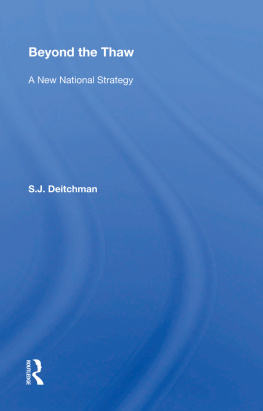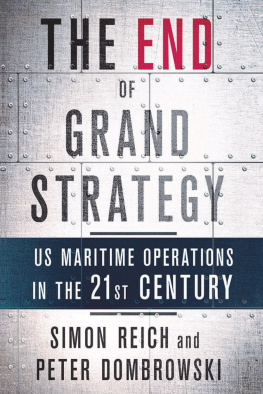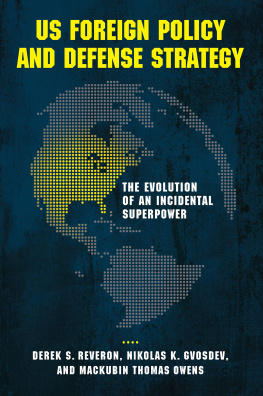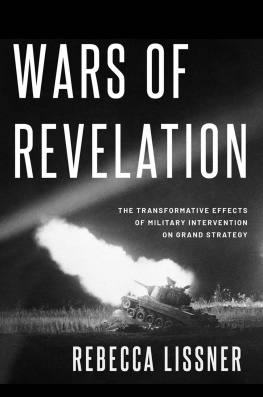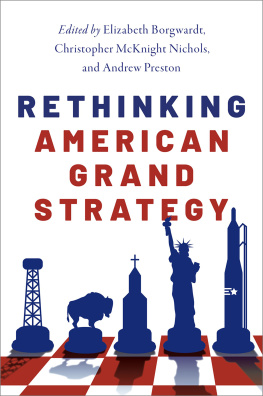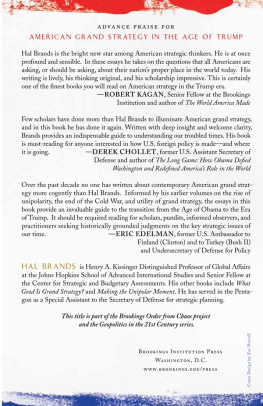
After a desultory post-Cold War insider debate, the US national security establishment settled on an ambitious grand strategy to integrate states great and small into a US led liberal international order. Despite the poor performance of this grand strategy for the last quarter century, particularly its propensity for war, advocates continue to rely on a handful of key arguments as to why it is both essential and doable. This book takes on these arguments one by one, and demonstrates their weakness. The key elements of a new, more cautious, and more cost-effective grand strategy-restraint are then systematically advanced and assembled into a coherent whole. Those uneasy with the present US course of action, and hungry for an alternative, will find allies in these pages.
Barry R. Posen, Massachusetts Institute of Technology, USA
A. Trevor Thrall and Benjamin H. Friedman have assembled the intellectual A-Team of national security analysts in US Grand Strategy in the 21st Century. Covering the regional and functional waterfront, the authors of this timely and compelling volume demonstrate that the American pursuit of global hegemony over the past quarter century has been neither necessary nor realistic. The only puzzle remaining after reading this essential corrective to Americas collective Liberal hegemonic delusion is why we fell for any alternative to restraint?
Michael Desch, University of Notre Dame, USA
The essays in this volume shine a bright and skeptical light on Americas global military commitments, and make a compelling case for restraint in US strategy. The book includes fruitful discussions of the social science literature bearing on various strategic questions like nuclear proliferation, oil security, democracy promotion, and military intervention. It offers superb dissections of the role of distance, national character, public opinion, and built-up military institutions in shaping national strategy. The authors show, with keen argument and telling evidence, that restraint rather than primacy offers a superior route to ensuring Americas security, liberty, and prosperity.
David Hendrickson, Colorado College, USA
Americas recent unhappy experiences in Afghanistan, Iraq, and Libya have caused many Americans to question the basic contours of U.S. foreign policy, but they lack the confidence to challenge these ideas directly, and they are uncertain about realistic alternatives. This book helps fill in the details. It shows why warfare in the 21st century is unlikely to produce desirable results at reasonable costs. It challenges the notion that a forward-leaning U.S. military posture is required to produce safety and prosperity. And it shows why a more restrained foreign policy would better align with classic American values of limited constitutional government, individual liberty, free markets, and peace. Taken together, the entries in this volume reassure readers that the United States can remain engaged in a complex world without having to manage it.
Christopher Preble, Vice President of Defense and Foreign Policy, the Cato Institute, Washington DC, USA
US GRAND STRATEGY IN THE 21ST CENTURY
This book challenges the dominant strategic culture and makes the case for restraint in US grand strategy in the 21st century.
Grand strategy, meaning a states theory about how it can achieve national security for itself, is elusive. That is particularly true in the United States, where the division of federal power and the lack of direct security threats limit consensus about how to manage danger. This book seeks to spur more vigorous debate on US grand strategy. To do so, the first half of the volume assembles the most recent academic critiques of primacy, the dominant strategic perspective in the United States today. The contributors challenge the notion that US national security requires a massive military, huge defense spending, and frequent military intervention around the world. The second half of the volume makes the positive case for a more restrained foreign policy by excavating the historical roots of restraint in the United States and illustrating how restraint might work in practice in the Middle East and elsewhere. The volume concludes with assessments of the political viability of foreign policy restraint in the United States today.
This book will be of much interest to students of US foreign policy, grand strategy, national security, and International Relations in general.
A. Trevor Thrall is a Senior Fellow in the Defense and Foreign Policy Department, Cato Institute, USA, and editor of Why Did the United States Invade Iraq? (Routledge, 2011) and American Foreign Policy and the Politics of Fear (Routledge, 2009).
Benjamin H. Friedman is a Foreign Policy Fellow and Defense Scholar at Defense Priorities and an Adjunct Lecturer at George Washington Universitys Elliott School of International Affairs.
ROUTLEDGE GLOBAL SECURITY STUDIES
Series Editors: Aaron Karp and Regina Karp
Global Security Studies emphasizes broad forces reshaping global security and the dilemmas facing decision-makers the world over. The series stresses issues relevant in many countries and regions, accessible to broad professional and academic audiences as well as to students, and enduring through explicit theoretical foundations.
Stable Nuclear Zero
The vision and its implications for disarmament policy
Edited by Sverre Lodgaard
Nuclear Asymmetry and Deterrence
Theory, policy and history
Jan Ludvik
International and Regional Security
The causes of war and peace
Benjamin Miller
US Foreign Policy Towards the Middle East
The realpolitik of deceit
Bernd Kaussler and Glenn P. Hastedt
North Korea, Iran and the Challenge to International Order
A comparative perspective
Patrick McEachern and Jaclyn OBrien McEachern
US Grand Strategy in the 21st Century
The case for restraint
Edited by A. Trevor Thrall and Benjamin H. Friedman
US GRAND STRATEGY IN THE 21ST CENTURY
The Case for Restraint
Edited by A. Trevor Thrall and Benjamin H. Friedman
First published 2018
by Routledge
2 Park Square, Milton Park, Abingdon, Oxon OX14 4RN
and by Routledge
711 Third Avenue, New York, NY 10017
Routledge is an imprint of the Taylor & Francis Group, an informa business
2018 selection and editorial material, A. Trevor Thrall and Benjamin H. Friedman; individual chapters, the contributors
The right of the editors to be identified as the authors of the editorial material, and of the authors for their individual chapters, has been asserted in accordance with sections 77 and 78 of the Copyright, Designs and Patents Act 1988.
All rights reserved. No part of this book may be reprinted or reproduced or utilised in any form or by any electronic, mechanical, or other means, now known or hereafter invented, including photocopying and recording, or in any information storage or retrieval system, without permission in writing from the publishers.
Trademark notice: Product or corporate names may be trademarks or registered trademarks, and are used only for identification and explanation without intent to infringe.


